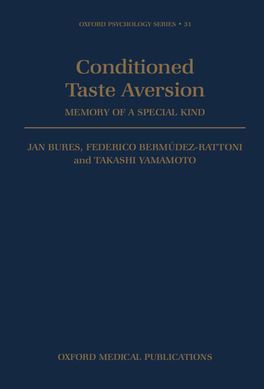Conditioned Taste Aversion

Conditioned Taste Aversion
|
ISBN: |
9780198523475 |
|
Binding: |
Hardback |
|
Published: |
1 Aug 1998 |
|
Availability: |
|
|
Series: |
$271.00 AUD
$310.99 NZD
Add To CartDescription
Conditioned taste aversion (CTA) is a robust defence device protecting animals against repeated consumption of toxic food. It is characterised by the ability of many animals to learn to avoid certain substances by their sight, smell, or taste after experiencing an unpleasant or harmful reaction to them. CTA is encountered at all levels of evolution, with similar forms of food aversion learning found in vertebrate and invertebrate species whose ancestral lines
diverged more than 500 million years ago. CTA has a number of unusual properties contrasting sharply with the basic assumptions of traditional learning theories, which has brought it increasingly to the
attention of neurobiologists interested in neural plasticity. In CTA, the usual time parameters between stimulus and aversion are relaxed considerably, frequently with delays of hours rather than seconds. Moreover, the critical stage of CTA acquisition may proceed under deep anaesthesia incompatible with other forms of learning. In the past decade several pivotal discoveries have considerably avanced our understanding of the neural processes underlying CTA, and opened new possibilities for
their analysis at the molecular and cellular levels. This book, written by three of the world's leading researchers in the subject, comprehensively reviews the current state of research into conditioned
taste aversion. The first book of its kind to provide an up-to-date summary of research into the neuroanatomy, pharmacology, electrophysiology, and functional morphology of CTA, it will be welcomed by all researchers and graduate students in the field.
Contents
Preface
1: Ethology, physiological psychology, and neurobiology of CTA
2: The CTA paradigm: Terminology, methods, and conventions
3: Neuroanatomy of CTA: Lesions studies
4: Functional ablation studies of CTA
5: Pharmacology of CTA
6: Electrophysiology of CTA
7: Funtional morphology of CTA
8: Transplantation studies
9: Paradoxes, projections, and perspectives of CTA research
References
Index
1: Ethology, physiological psychology, and neurobiology of CTA
2: The CTA paradigm: Terminology, methods, and conventions
3: Neuroanatomy of CTA: Lesions studies
4: Functional ablation studies of CTA
5: Pharmacology of CTA
6: Electrophysiology of CTA
7: Funtional morphology of CTA
8: Transplantation studies
9: Paradoxes, projections, and perspectives of CTA research
References
Index
Authors
Jan Bures , Institute of Physiology, Videnska, Czech Republic
F. Bermudez-Rattoni , Instituto de Fisiologia Cellular, UNAM, Mexico
T. Yamamoto , Professor, Department of Behavioural Physiology, Osaka University, Japan